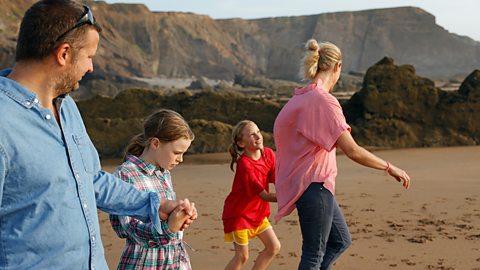Sign up to the BBC Bitesize newsletter! External LinkSign up to the BBC Bitesize newsletter!
For home education news and stories plus updates on the latest Bitesize content, register for our newsletter today.

If you’ve decided home education is the right option for you and your child, you’ll also be thinking about the different ways you can educate them. Not all of that learning needs to take place inside your four walls.
You might also be concerned about cost, but whether you want to try the theatre, museum, aquarium or fossil hunting, there are plenty of fun and budget-friendly ways to continue your child’s education outside the home.
Fun, free activities for home educated families
1. Visit museums and make the most of their home education offers
There are so many types of museums you can visit while home educating your child: museums of local history, natural history museums, science museums, historic homes, living museums, biographic museums.
Many museums are free to enter and many offer special home education days. The British Museum offers free Home Education Days for children aged 5–11 (Key Stages 1 and 2) and 11–16 (Key Stages 3 and 4), as well as various programmes for home-educated children aged 7-18 (KS2 to KS5).
The National Space Centre in Leicester offers a free Home Education Day for children aged 6-14, and Techniquest science museum in Cardiff offers a discounted term-time visitor rate and home educator day activities.
You can link many museum visits to the curriculum. For example, if you’re teaching your child about famous people from history, you could visit the Grace Darling Museum in Bamburgh in Northumberland. It’s free to enter. You can learn about World War Two or the Victorians at Milestones Living History Museum’s free Home Education Day in Hampshire. Or Beamish Museum in County Durham offers term-time weekday discounts if you want to show your child what life was like in the industrial North from the 1820s to the 1950s.
If your child prefers being outdoors or running around discovering things, you could try historic trails, national monuments and fossil hunting. Learn about World War One or World War Two for free at the National Memorial Arboretum in Staffordshire.

Take your lessons on the Romans outside at Hadrian’s Wall in Cumbria. You can visit the wall along any stretch, or Hadrian’s Wall Visitor Information Centre in Brampton is free to enter. Or go fossil hunting along the Jurassic Coast, and pop in to the Lyme Regis Museum to learn about fossil hunter Mary Anning (fees apply, check online).
If you’re visiting National Trust properties such as Knole, where you can learn about the Tudors, they offer home educating families a discount with an Education Group Access Pass. There are often nature trails, gardens and printout activities to explore at properties like these. If your child loves castles, English Heritage offers free term-time education visits, including at some sites for GCSE study.
Don’t forget, if your child has a Blue Peter badge, they can get into over 200 UK attractions for free. Learn about the Tudors at Hampton Court Palace, plants and the natural world at the Eden Project in Cornwall, or Science, Technology, Engineering and Mathematics (STEM) subjects at Eureka! The National Children’s Museum in Halifax, West Yorkshire.
2. Get education rates and discounts at theatre shows
Many local and national theatres offer discounts for home educators to see performances at schools’ rates, which are a lot cheaper than full-price tickets. Email or contact the theatre via their website, and be prepared to book well in advance.
There are also companies offering ‘seat filler’ tickets, which means you may be able to see a show for free at the last minute if tickets aren’t selling well. Be aware that not all shows will be suitable for younger audiences. If you have slightly older children, the New Vic Theatre in London offers 50 tickets for free for new productions for young people aged 17 to 25.
Organisations like Disney on Stage and English National Opera offer relaxed performances during the day for adults and children over five, aimed primarily at people with 'disabilities, health conditions and other access needs'. You’ll need to check the cost of these performances on their website, but the schools’ ticket price offer often applies.
If your child wants to be involved in theatre, rather than just watching, some venues such as The Met in Bury offer a specially-created drama class for children and young people who are home educated.

If you live in or near Edinburgh, or you can get there on a budget, The Edinburgh Festival Fringe has free street entertainment, children’s shows and performances for over three weeks every August.
If you and your child love theatre but can’t get out of the house, Half Moon Theatre On Demand offers a streaming service for children’s shows, at around £8 a show. National Theatre has also made 20 productions available for free in public libraries across the UK. Check your local library to see which shows they offer.
However you decide to see a show, there are learning opportunities before, during and after, such as reading scripts or drafting your own, making masks and costumes, performing a scene from a play, or analysing the characters or the meaning. The Shakespeare Birthplace Trust has free downloadable resources for home educators.
3. Take your children to see nature or animals
Aquariums are a great place to visit with your children and learn about the ocean, marine life and biodiversity. The National Marine Aquarium in Plymouth offers Home Education Wednesdays for £5.50 (adult goes free). Bristol Aquarium, among others, offers their education rate on weekdays in term time. Anglesey Sea Zoo is free for Blue Peter Badge holders.
There are also zoos, farms and petting zoos you can visit. Some zoos will offer term-time and education rates, otherwise you can benefit from off peak rates. Knowsley Safari Park offers a discounted Home Educators Take Over Day and Blue Peter Badge holders get into Edinburgh Zoo and New Forest Wildlife Park for free.
You could also arrange to visit a local stables or volunteer at an animal shelter if you want to teach your child about animal welfare or maintenance.

4. Turn outdoors activities into a low-cost learning experience
The best thing about the outdoors is it can be free! You can go looking for crabs, starfish and insects in rock pools at the beach, scour coastlines for fossils or learn about the geology of the coastline, weather patterns, coastal processes and landforms.
You could learn about waterways on canals or rivers, as well as the wildlife and plants that populate them. Or you could teach them about different artists and sculpture at Yorkshire Sculpture Park, entry is free but parking charges may apply.
At different times of the year there are also corn mazes, pumpkin patches and other outdoor events, which can help your child learn about crops, the seasons and farming.
With a Blue Peter Badge, your child can also go free outdoors at the National Botanic Garden of Wales, Cheddar Gorge in Somerset, and RHS Garden Rosemoor in Devon.

5. Plan other daytime educational trips and visits
There are other places you can visit as part of a home education outing, such as libraries, arts centres, community centres, local parks and even factory tours. Wedgewood and Emma Bridgewater, who both make pottery in Stoke-on-Trent, have factory tours – email them to check prices.
If you want to teach your child about farming and the meat industry, you could take them on a tour of Smithfield Market in London, but charges do apply.
Several community groups are now running sustainable dye gardens in local parks, where your children can learn about flowers, fruit or veg to grow and how their colour is used for dyeing paper and fabrics. Check out your local park social media or notice boards for details. Maybe you could make a tie-dye t-shirt afterwards or upcycle a bag into a t-shirt.
During term time, you can also take advantage of cheaper holiday rates and off-peak travel. You could also consider something like a house swap with another family to save money. Finally, it’s worth researching coupon and voucher offers for family-friendly holidays and attractions, which can often save you a lot of money on days out.
Where can I find more ideas for fun activities?
Looking for some more fun things to do with your child? Check out the links below!
Seven ways to get your kids outdoors
Five ways to keep children active
Where can I find more support for home education and parenting?
The BBC Bitesize home education collection is designed to support you and your child’s learning at home with free resources for early years and foundation stage (EYFS), primary and secondary-age students.
Bitesize Parents’ Toolkit is the go-to place for the whole parenting community to find stories, expert advice and fun activities.
If your child has special educational needs and / or disabilities, be sure to check out the Parents’ Toolkit SEND collection. Bitesize also has a collection of Sensory Stories, an immersive video series that transports you on unique sensory adventures, for children with additional or complex needs.
For more information about home education, these BBC News articles cover the rise in families deciding to educate their children at home and, from 2021, the impact of Covid on home education.